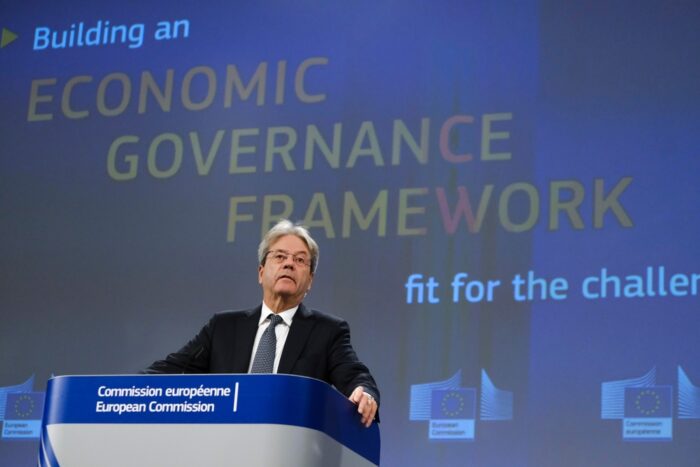The Progressive Post
Pills of hope – priorities for left-wing politics

Europe is shaken by war and by its economic and social effects, compounding the fears and pains produced by the lasting pandemic. The authoritarian dynamic unleashed by inequalities and loss of certainties is gaining further ground everywhere. In this context, prompt measures to deal with the current state of affairs need to be coupled with a radical commitment to address its long-term origins, to reconnect institutions with people’s aspirations and knowledge, and to push forward concrete proposals for a new ‘life and work’ paradigm.
Addressing the long-term causes of our current pain
The failure to connect to the aspirations and knowledge of millions of people, to listen to their fears and ideas, and to come up with an alternative vision to the current trend and with the radical policies needed to achieve that vision is common in many Western nations, where there is a striking and seemingly unbridgeable gap between the countries’ spontaneous vibrancy and political organisations.
The capacity and courage of vision, the practices, methods, proposals and thousands of experiences concerning fundamental services, the care for people, and the ecosystem, the organisation and dignity of labour, the entrepreneurial engagement, the just use of digital innovations, the protection of civil rights and the fight against all forms of discrimination and racism: this is the social and economic ferment that lies concealed under the ash of apathy and political disengagement. They are the expression of very different actors and forms of civic action, movements, active citizen organisations, organised labour, innovative business and social enterprise. It represents the building-block of a possible path to a greater ‘substantive freedom’, a development aimed at social and environmental justice with people at its centre. But this ferment only rarely generates or influences political parties, which remain the only vehicle to turn the ‘sentiments’ and ‘experiments’ of society into systematic policies and actions.
Back in June 2020, reflecting on the early months of the pandemic, the Forum on Inequality and Diversity (ForumDD) in Italy expressed a deep concern, which can be summarised as follows: no adequate lessons were being drawn from the new crisis beyond the important, unprecedented step to resort to public intervention at EU-wide level – the Recovery and Resilience Facility. A neoliberal normalisation culture still prevailed, with a switch from austerity, where public spending is considered intrinsically bad, to an attitude where public spending is good in itself, even when there is no serious reflection on how to spend or no involvement of social actors in the public spending strategy.
This approach, while buying time by turning public spending into wages, profits and rentiers’ income, would not address – and in the medium term would actually further increase – the anger and resentment of the most vulnerable people. These had already been on the rise for over a decade due to growing inequalities and loss of recognition (of their role and aspirations). Such an approach, in turn, would further boost an authoritarian dynamic whereby people are appeased by the illusion of rebuilding a ‘homogeneous identity’ and of being protected by new walls from the ‘invasion’ of migrants and new ideas. Finally, this authoritarian dynamic could blend with neoliberal normalisation into a poisonous concoction.
Unfortunately, this is what is happening.
A similar preoccupation was expressed in October 2021 for the whole of Europe by the Progressive Society Report promoted by the Socialists & Democrats Group: the Report argued that “a widespread and narrow understanding of resilience is that of returning to a previous state after disturbance”, and it stated: “This is not our understanding”. A list of ideas and radical proposals was therefore put on the table, appropriately labelled “The Great Shift”. What have we all made of those ideas and radical proposals?
Some of these ideas and proposals are actually part of the EU legislative action, investments or debate. They are concrete pills of hope. But this is far from enough. They occupy the backstage, with the old neoliberal culture still front stage. Much stronger political engagement and support are needed for these ideas to fly, winning the hearts and minds of people and dislodging the old culture. Pushing these ideas and proposals forward should be our common goal today. Here are five examples of such proposals that urgently need to be supported.
Health and research results as a common good
A major priority which is strongly felt by all European citizens is a universal, high-quality, affordable healthcare system, prepared to address major infectious diseases and impending problems such as resistance to antibiotics, degenerative disorders and rare diseases. A major miss-alignment exists between this public priority and the selection criteria and choices of the pharmaceutical industry. This gap has led to the failure to invest in vaccines after the 2003 SARS crisis. When the Covid-19 pandemic exploded, it was addressed via subsidies which paid for unprecedented and unacceptable monopolistic prices of vaccines: 71 billion euros between June 2020 and December 2021, for the whole EU.
A much more effective, safer, fairer and far less expensive solution is at hand: building a permanent science-driven public infrastructure that would perform both biomedical research and development, with the mission to deliver affordable medical innovation to everyone. A special proviso would ensure that every result would be considered a common good, open to all. Its governance would be inspired by existing European infrastructures like the European Organisation for Nuclear Research (CERN) and its budget would be similar to that of the European Space Agency.
A detailed proposal, originally born within the ForumDD, was discussed and taken very seriously on 28 September in the European Parliament at the request of the Science and Technology Assessment Panel. It is supported by a wide range of very high-level scientists and civic organisations all over Europe. But in order to fly, it now needs urgent and robust EU-wide political support.
A new place-based sensitive method to design and implement essential services and universal welfare
This is a major visionary priority that the Great Shift made its own. It is not about public spending. It is about how to spend. The Report for example proposes: to ensure that “structural reforms entail a place-based sensitivity” and that “the information on investment and reforms financed by the EU are properly accessible to all citizens”; to promote the “public and open scrutiny of policy implementation at place level”; to involve “citizens in deliberative and participatory settings”. These are some of the features of a new method of public policy for essential services and welfare that go together with a new multilevel governance and a major shift in the recruitment and capacity of public administrators, at both central and local levels. It is a method that can reconnect institutions to the needs and aspirations of people, by ensuring a fair and fruitful encounter between global, technological knowledge and the knowledge embedded in every place.
It is the new frontier of democracy. But it is not yet part of our common culture. We are still ready to fall into “bastard Keynesianism”, as Joan Robinson called it, concentrating only on spending quickly in a one-size-fits-all way and concentrating on physical outputs rather than outcomes.
Have we avoided this mistake in the design and implementation of the Recovery and Resilience Facility and National Recovery and Resilience Plans? With reference to Italy, the ForumDD has repeatedly signalled – including with a letter to the European Commission – the serious mistakes that were being made: only a few of them were taken on board by the Italian government. A specific paper on Childcare produced by the Recovery Watch Project confirms this view for other countries too.
Redirecting digital transformation towards social justice
This is a clear priority once we are aware of the radical bifurcation that the new technology has opened up: on one route, the chance of greater substantive freedom, and greater capabilities for all; on the other route – the one we are on currently – more subalternity to a few centres of power.
The Great Shift tackled this issue, with particular reference to the design and use of algorithms. It also proposed “establishing a EU framework for data altruism to enable forms of data sharing that serve the public good”. Things are actually moving in this direction in the EU regulatory framework. The last and important step was made last May by the Data Governance Act, which establishes the ground both for data altruism and for a safe reuse of public sector data.
It is clear that the EU is opening up a new exciting and mobilising route, away both from the US corporate-centred model and the China state-centred model. But this is not part of the political debate and has not adequately reflected in the EU RRF Guidelines on digital transformation. It is time for all of us to remedy this, both in a cultural and a political dimension.
A universal inheritance at a set age
A great source of inequality affecting young people at a crucial step of their life, when they leave school, is family wealth. Even when public education is successful in (at least partly) compensating for children’s different social and family contexts, their after-school freedom of choice strongly depends on whether they can rely or not on their family’s financial support, often described as an advance on their future bequest. The significant concentration of wealth in the last forty years has further increased the privilege linked to the birth lottery. A progressive inheritance tax contributing to society as a whole is necessary but not enough. It needs to be supplemented by a universal capital grant to all individuals.
The need and features of such a measure were discussed at a two-day meeting on Universal Inheritance and Basic Income organised by the EU Science Hub of the Joint Research Centre. According to a detailed proposal for Italy designed by the ForumDD and presented at the meeting, the wealth transfer of 15,000 euros (equivalent to about 10 per cent of Italian average net wealth) to all young people reaching the age of 18 would be universal and unconditional. It would be accompanied by mentoring services, starting at the age of 14, to foster informed and autonomous choices, and financed by a reform of the current taxation of wealth transfers.
A proposal of this kind would truly empower young people and would create an environment where their choices would be at the same time freer and publicly debated, with children of different classes and family incomes and wealth being treated as equals.
Democratisation of corporate governance, workers’ power and social and environmental concerns
The shareholder-value view of companies, the weakening of the voice and power of labour, the absolutely inadequate role of other stakeholders holding social and environmental interests: these are among the main causes of both greater inequality and greater environmental injustice. The Great Shift was adamant about it and called for “strengthening employees’ right”, “giving stakeholders a say in corporate strategies”, “bolstering workers’ right to information and consultation especially with regards to the management of change and restructuring”, “eliminating incentives for company directors to focus excessively on shareholder interests”.
This vision has been turned into a detailed proposal by ForumDD to give both workers and citizens holding environmental interests a co-decision role, by establishing, alongside the Board of Directors of medium- and large-size companies, a ‘workers and company citizenship council’. This council would address the impact of companies’ strategy on labour, territories and the environment. It would include all workers who make a relevant contribution to the company value creation regardless of contractual arrangements, and representatives of local communities affected by the environmental consequences of the business activities. It would then allow the social and environmental effects of companies’ decisions to be assessed, debated and influenced before those decisions are implemented. In the EU as a whole, an important opportunity is offered now by the EC proposal of a Directive on Corporate Sustainability Due Diligence, where in particular article 25 could open up new opportunities, as pointed out in the feedback of ForumDD.
Conclusion
All five priorities represent ‘pills of hope’ or, rather, ‘seeds of hope’. But they are just seeds. To be turned into robust trees changing our current ‘life and work’ paradigm, they require rigorous, radical, innovative politics triggering a heated and informed public debate and mobilising society, all over Europe.
Several networks bringing together active citizens organisations, social movements, organised labour and innovative business are acting in this direction, all over Europe. But it is now time for political parties carrying the flag of environmental and social justice to get their acts together. The only way to bring to a halt the convergence of the authoritarian dynamic with neoliberal conservatism is to reconnect to the social and economic ferment of society by moving ahead with radical proposals proposed here.
Photo credits: Alexey Komarov
licensed under the Creative Commons Attribution-Share Alike 4.0 International license




